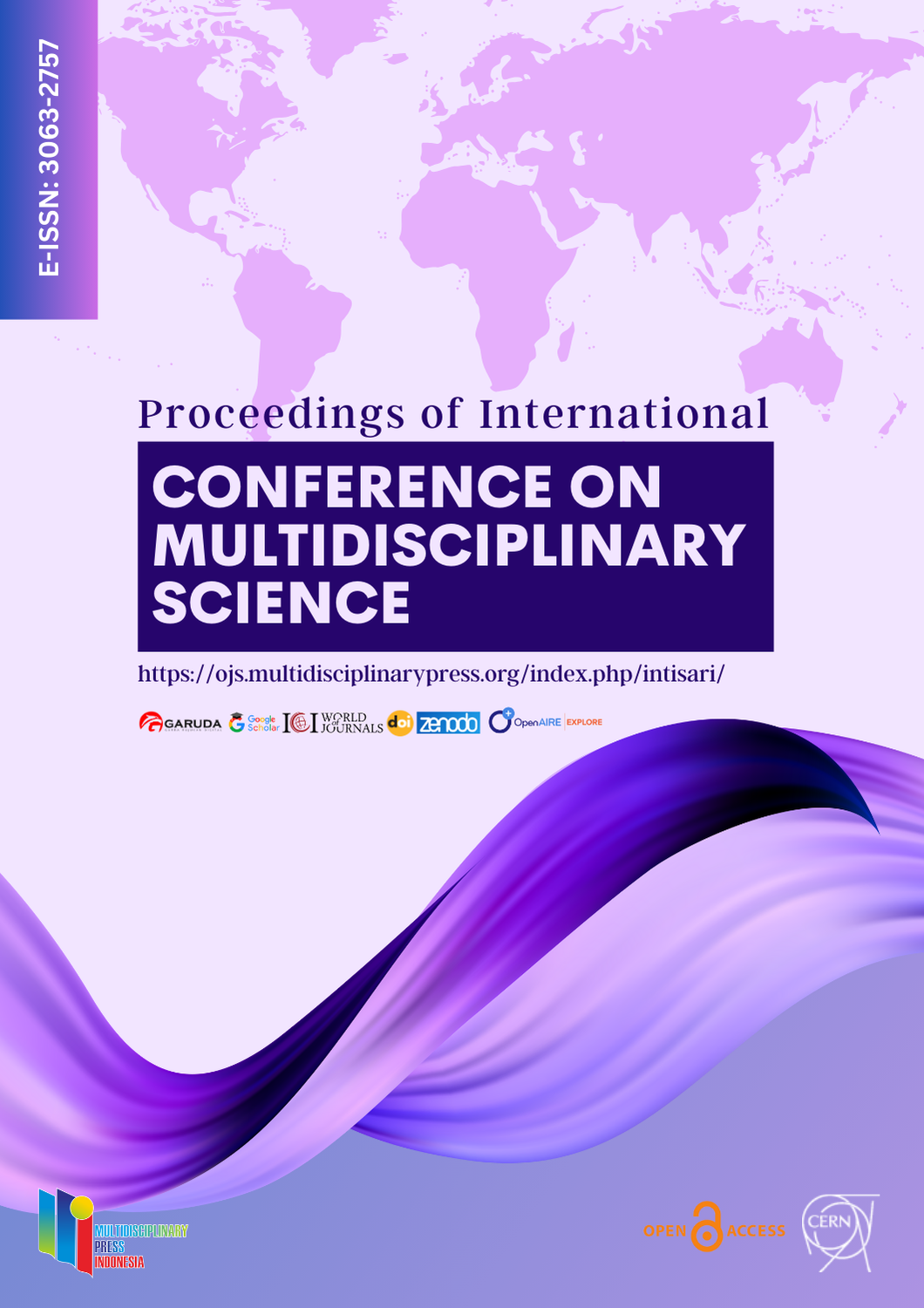The Influence of Knowledge Management on The Culture of Knowledge Sharing in The Ministry of Religion in Binjai City
Keywords:
knowledge management, sharing cultureAbstract
The aim of this research is to determine and analyze the influence of knowledge management on the culture of sharing in the Ministry of Religion of Binjai City. This research was conducted using a causal associative quantitative approach. The sample used was all employees with a total of 105 people taken using proportional sampling. The research results show that knowledge management has a positive and significant effect on sharing culture. This is shown by the T-count value of T-count of 19.564 > t table 1.65978, with a significance value of 0.000 < 0.05. The regression coefficient shows that if knowledge management is increased by 1 unit, then sharing culture will increase by 0.644 units assuming other variables remain constant. Apart from that, the results of the determination test show an Adjusted R Square value of 0.786 or 78.60%, which indicates that knowledge management has a high influence on sharing culture, while the remaining 21.40% is influenced by other factors that have not been studied. Thus, partially, knowledge management has a positive and significant effect on the culture of sharing in the Ministry of Religion of Binjai City. It identifies that improvements in knowledge management can contribute to an enhanced sharing culture.
Downloads
References
Abubakar, AM (2019). Knowledge management, decision-making style and organizational performance. Journal of Innovation & Knowledge.
Asbari, M., & Novitasari, D. (2020). The Influence of Knowledge Sharing and Cultural Mediation Activities on Teacher Innovation Ability. Journal of Educational Management and Supervision.
Auliana, S., & Nurasiah, I. (2018). Application of Knowledge Management in the Higher Education Data Reporting Process. Indonesian Journal of Strategic Management, 1(1). https://doi.org/10.25134/ijsm.v1i1.838
Azeem, M., Ahmed, M., Haider, S., & Sajjad, M. (2021). Expanding competitive advantage through organizational culture, knowledge sharing and organizational innovation. Technology in Society, 66. https://doi.org/10.1016/j.techsoc.2021.101635
Dalkir, K. (2005). Knowledge Management In Theory and Practice. House, Jordan Hill, Oxford OX2 8DP.
Fahmi, I. (2013). Performance Management, Theory and Applications. Alphabet.
Ghozali & Latan. (2015). Concepts, Techniques, Applications Using Smart PLS 3.0 for Empirical Research. BP Undip. Semarang Harnanto. 2017. Cost Accounting: Historical Cost Systems. BPFE.
Ghozali, Imam & Latan, H. (2015). Partial Least Squares "Engineering Concepts and Applications Using the Smart PLS 3.0 Program." Diponegoro University.
Handiman, U. (2023). Strategic Human Resource Management and Employee Relations (1st ed.). We Write Foundation.
Kuncooro, Munajad. (2013). Research Methods for Business and Economics. Edition 4. Erlangga.
Lestari, RA, & Santoso, SA (2022). Public Services in Good Governance.
Millmore, M., Lewis, P., Saunders, M., Thornhill, A., & Morrow, T. (2007). Strategic Human Resource Management. Prentice Hall.
Mishra, M., & Pandey, A. (2019). The impact of leadership styles on knowledge-sharing behavior: A review of the literature. Development and Learning in Organizations. https://doi.org/10.1108/DLO-06-2018-0067
Nurcahyo, SA, & Wikaningrum, T. (2020). The Role of Knowledge Sharing, Learning Organization and Individual Innovation Capability on Employee Performance. Journal of Economics and Business, 21(2), 84. https://doi.org/10.30659/ekobis.21.2.84-96
Partogi, SA, & Tjahjawati, SS (2019). The Effect of Knowledge Sharing on the Performance of Government-Owned Company Employees. Journal of Business and Investment Research, 5(3), 46–57. https://doi.org/10.35313/jrbi.v5i3.1698
Qisty, S.N. (2021 CE). Implementation of knowledge sharing with the Binus Portal media at Bina Nusantara University. Informatio: Journal of Library and Information Science, 1(2), 167. https://doi.org/10.24198/inf.v1i2.34055
Rosita, S., & Khalik, I. (2022). The Influence of Knowledge Management and Transformational Leadership on Employee Performance with Job Satisfaction as an Intervening Variable at the Meranti Community Health Center, Merangin Regency. 4(1).
Sari, AE (2022). The Influence of Knowledge Sharing on Employee Knowledge Management at the Regional Secretariat of Kerinci Regency, Mediated by Transfer of Training. 2(1).
Sedarmayanti, & Nurliawati, N. (2012). Strategy for Strengthening Bureaucratic Ethics and Integrity in the Context of Corruption Prevention to Improve Service Quality. Journal of Administrative Sciences, 9(3).
Sihite, M. (2018). Strategy for Building Highly Competitive Human Resources.
Sugiyono. (2018). Combination Research Methods (Mixed Methods). CV. Alphabet.
Sugiyono. (2019). Quantitative and Qualitative Research Methodologies and R&D. Alphabet.
Surasni, NK (2020). Study of the Impact of Leadership and Organizational Culture on Knowledge Sharing in the Regional Drinking Water Company on Lombok Island. Mataram University Journal, 9(2).
Tupamahu, F.A.S., Pelamonia, M., & Pinoa, W.S. (2021). The Moderating Impact of Knowledge Sharing and Teamwork Behavior on Lecturer Productivity. Journal of Educational Management and Supervision, 5(1), 12. https://doi.org/10.17977/um025v5i12020p286
Ur Rehman, U., & Iqbal, A. (2020). Nexus of knowledge-oriented leadership, knowledge management, innovation and organizational performance in higher education. Business Process Management Journal, ahead-of-print. https://doi.org/10.1108/BPMJ-07-2019-0274
Wibowo. (2014). Behavior in Organizations. Second Edition. PT Raja Grafindo Perdsada.
Downloads
Published
How to Cite
Issue
Section
Categories
License
Copyright (c) 2024 Ujiani, Mesra B

This work is licensed under a Creative Commons Attribution 4.0 International License.





